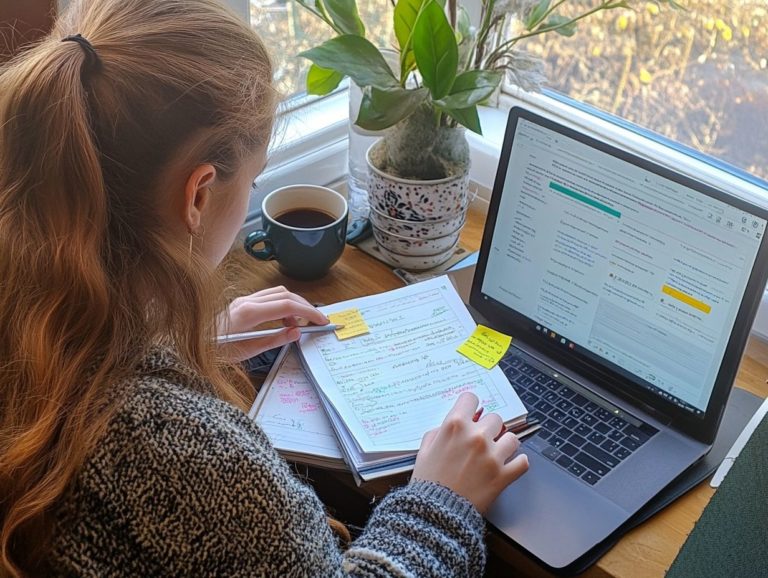the best resources for test-taking strategies
Navigating the world of exams can feel overwhelming. Get ready! This guide is packed with practical tips that will help you shine on your exams.
This guide offers practical strategies to help you prepare, maintain your composure, and perform at your peak when it matters most.
You’ll explore everything from understanding the test format and crafting a personalized study plan to employing memory techniques and managing your time efficiently.
You will also discover how to sidestep common pitfalls and keep anxiety firmly at bay. Immerse yourself in this comprehensive guide to achieve test success!
Contents
- Key Takeaways:
- 1. Understand the Format of the Test
- 2. Practice with Sample Tests
- 3. Develop a Study Plan
- 4. Use Memory Techniques
- 5. Learn Time Management Skills
- 6. Use Visual Aids to Aid Learning
- 7. Take Breaks and Get Enough Rest
- 8. Stay Calm and Focused During the Test
- 9. Read the Questions Carefully
- 10. Use Process of Elimination
- 11. Don’t Spend Too Much Time on One Question
- 12. Make Educated Guesses
- 13. Review Your Answers
- 14. Seek Help if Needed
- 15. Don’t Let Test Anxiety Get the Best of You
- Unlock Your Success: Top Exam Strategies!
- Frequently Asked Questions
- What are the best resources for test-taking strategies?
- How do online articles help with test-taking strategies?
- How Can Test-Taking Strategies Vary Depending on the Type of Test?
- What Are Some Common Mistakes to Avoid During a Test?
- How Can One Prepare Mentally and Emotionally for a Test?
- What Are Some Additional Resources for Test-Taking Strategies?
- Can books be effective resources for test-taking strategies?
- Are study guides useful for test-taking strategies?
- How can attending workshops benefit test-taking strategies?
- Is tutoring a good option for improving test-taking strategies?
Key Takeaways:
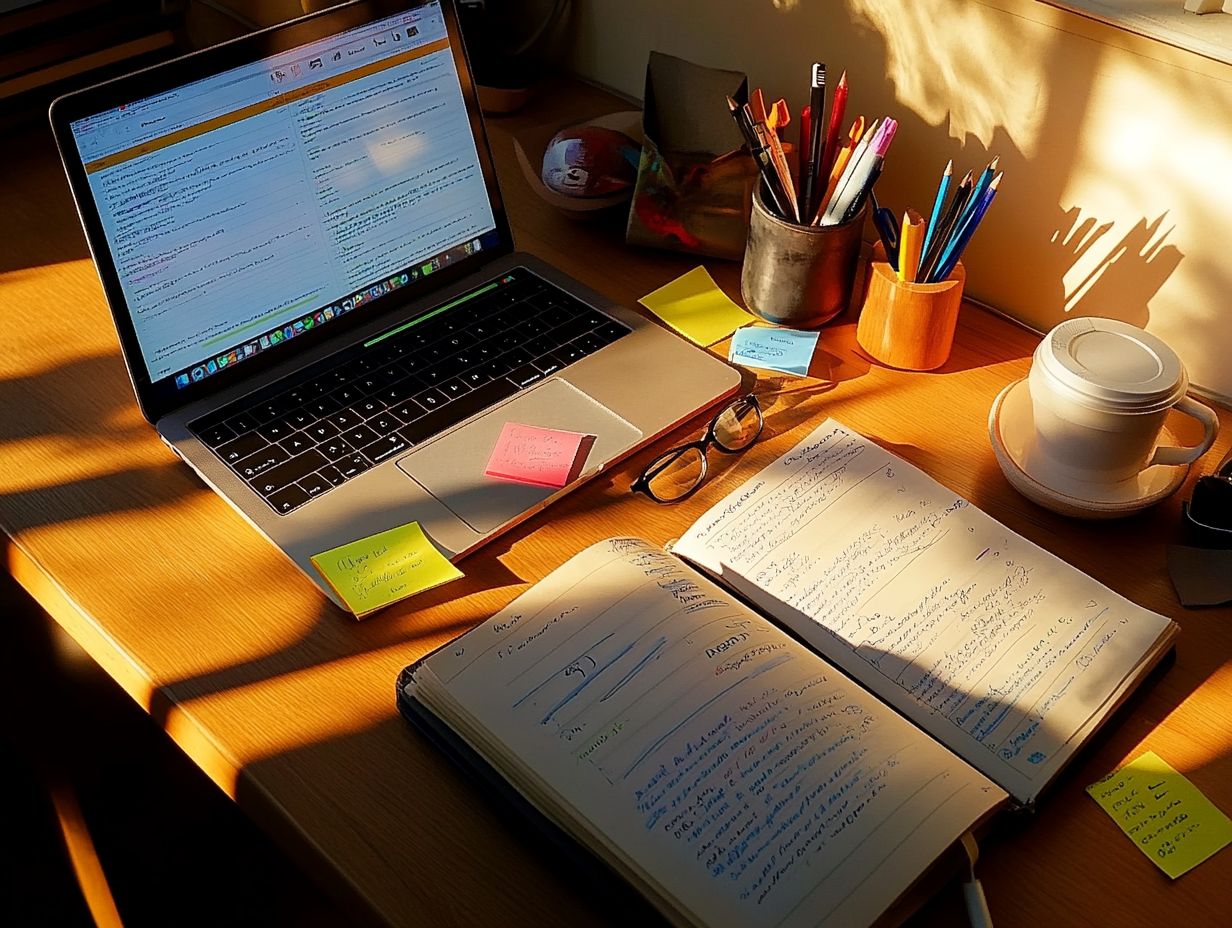
- Understand the test format to know what to expect.
- Practice with sample tests to get familiar with types of questions.
- Create a study plan to manage your preparation time effectively.
1. Understand the Format of the Test
Understanding the format of the test is essential for your exam preparation. It shapes the strategies you’ll employ, including specific test-taking techniques tailored to various question types like multiple choice and essays.
Familiarizing yourself with these exam techniques can significantly boost your exam mindset, allowing you to approach the test with confidence and clarity.
Different test formats challenge your skills in unique ways. For instance, multiple-choice questions often demand quick decision-making and the ability to distinguish between closely related options.
In contrast, essay questions require you to engage in critical thinking and present coherent arguments. Short-answer questions test your precision in articulating knowledge concisely.
By reviewing past exam history, you can uncover valuable insights into patterns of cognitive performance. This helps both educators and learners pinpoint areas for improvement and refine study strategies.
Understanding the test format improves your performance. It helps you tailor your study approach.
2. Practice with Sample Tests
Practicing with sample tests, including mock exams, is an invaluable strategy for self-assessment. It enables you to pinpoint gaps in your knowledge and review materials with precision.
By regularly engaging with these tests, you can significantly enhance your study efficiency. Each practice session provides targeted insights into areas that require improvement.
Platforms like Brainscape elevate this experience by using learning methods that help you focus on what you need to improve while reinforcing your strengths.
Incorporating strategies such as the Feynman Technique where you explain concepts in simple terms can deepen your understanding and retention of the material.
Ultimately, the combination of practice tests with innovative learning methods leads to remarkable improvements in your exam skills and boosts your confidence on test day.
3. Develop a Study Plan
Developing a well-structured study plan is crucial for you to study efficiently. This approach allows you to prioritize topics and allocate your time effectively.
For example, use visual aids, engaging group discussions, and hands-on practice to enhance your retention and understanding of the material.
Employing active learning techniques, such as summarizing key concepts or teaching others, will further deepen your comprehension.
It’s essential to adopt effective time management strategies. Breaking your study sessions into focused intervals and utilizing tools like the Pomodoro Technique can help prevent burnout.
Remember, balancing your study time with adequate sleep and mental breaks is vital for your brain health. This ensures your mind stays sharp and ready to absorb new information.
4. Use Memory Techniques
Using memory techniques like flashcards and the Feynman Technique can boost your ability to recall information during exams. You will remember things more effectively.
Spaced repetition is a method where you study material at increasing intervals, which further enhances retention. This optimizes your brain’s ability to absorb and remember information.
Mind maps are powerful tools that visually organize concepts. They make complex subjects much easier to understand.
For example, when studying biology, create a mind map to connect systems and processes. This helps you visualize their relationships.
Engaging with material through these techniques improves recall and deepens your understanding, leading to better academic performance.
5. Learn Time Management Skills
Mastering time management skills is crucial for implementing your study strategies and excelling on test day. It helps you focus on tasks that matter.
By allocating your time wisely, you can break down daunting projects into manageable segments. This ensures each area gets the attention it deserves without the stress of an impending deadline.
Incorporate timed practice tests into your routine. This simulates real exam conditions and allows you to measure your preparedness.
Consistently evaluate your progress and fine-tune your study plans. This cultivates a strategic approach that builds confidence and improves performance during examinations.
6. Use Visual Aids to Aid Learning
Incorporating visual aids into your study habits can significantly elevate your cognitive performance. They allow you to grasp complex concepts more effectively.
These aids, such as charts, graphs, mind maps, or infographics, are exceptional for organizing information. Charts can distill numerical data, making quick comparisons easier.
Mind maps encourage creative thinking, helping you visually connect ideas. Infographics present information in a concise format that enhances memory retention.
Using these diverse visual representations breaks down intricate information into manageable parts. This ultimately leads to improved comprehension and recall.
7. Take Breaks and Get Enough Rest
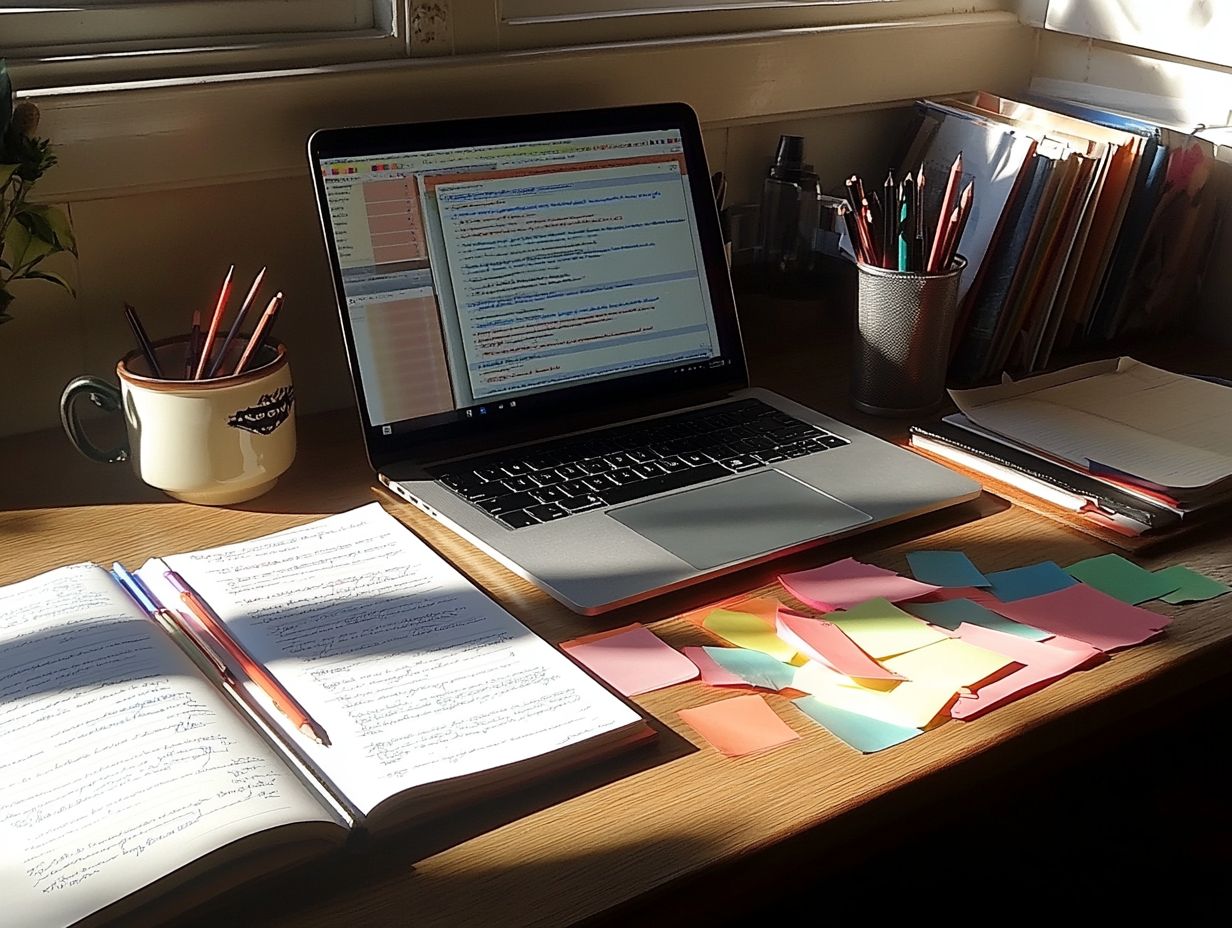
Regular breaks and sufficient sleep are crucial and can’t be overlooked! They are essential for managing stress and maintaining optimal brain health.
These components significantly affect your ability to retain information and maintain focus during study sessions. Implement short, timed breaks, like the Pomodoro Technique, to recharge your brain.
Establishing a consistent sleep schedule is key to regulating your circadian rhythms. This ensures you enjoy deeper, more restorative sleep.
During study breaks, relax with techniques like deep breathing or gentle stretching. This can enhance your mental clarity and overall well-being.
8. Stay Calm and Focused During the Test
Stay calm and focused; it s crucial for your success! This mindset minimizes anxiety and helps you perform your best.
Practicing techniques like deep breathing exercises can help you center your thoughts. They also alleviate the physical symptoms of anxiety.
Taking a moment to inhale deeply through your nose and exhale slowly can ground your mind, clearing away distractions that threaten to derail your concentration.
Incorporating mindfulness practices, such as visualization or focusing on the present moment, can significantly enhance your concentration.
This level of focus not only reduces stress but also improves your ability to retain information and solve problems effectively, ultimately elevating your performance on the test.
By embracing these methods, you create a ripple effect that leads to a more composed and rewarding testing experience.
9. Read the Questions Carefully
Carefully reading the questions and instructions is an essential exam technique that ensures you grasp exactly what is being asked, significantly reducing the risk of errors.
Taking the time to fully understand each question gives you the power to devise a clear strategy for your answers. For example, if you overlook keywords like “except” or “all but,” you might end up selecting answers that appear correct at first glance but are actually misleading.
Similarly, missing specific instructions about word limits or examples required can lead to incomplete answers. Focusing on the context and expectations boosts your confidence.
10. Use Process of Elimination
Using the process of elimination in answer selection, particularly for multiple-choice questions, can significantly enhance your chances of selecting the correct answer, even in the face of uncertainty.
This strategy helps you disregard irrelevant options. It narrows your focus to the most plausible answers. For instance, when you encounter a straightforward question about historical events, if two of the options contain glaring misspellings or incorrect dates, eliminating them quickly gives you a better shot at choosing the right answer from the remaining options.
For more complex questions, you can further benefit by dismissing answers that don’t logically align with the context of the question, which narrows down your choices even more. This method not only improves your overall test-taking experience but also gives you the power to make educated guesses when the situation calls for it.
11. Don’t Spend Too Much Time on One Question
Avoid spending too much time on a single question. Effective time management is key to better performance and cognitive efficiency.
To ensure your approach is as efficient as possible, consider setting specific time limits for each question based on the total duration of the exam. Breaking the exam into segments can help you maintain your pace, preventing the frustration that often builds when you feel rushed toward the end.
Recognizing when to move on from a challenging question is vital; lingering too long can jeopardize your ability to tackle the easier ones.
Keeping a mental or physical overview of your overall progress will give you the power to allocate your remaining time wisely, ensuring that every question gets the attention it deserves.
12. Make Educated Guesses
Use educated guesses to boost your chances of success! Trust your instincts and reasoning skills.
To know when to guess, assess the question’s context. Recall any relevant information that could guide your answer.
Break down the options presented, evaluating their plausibility based on what you already know. By eliminating the obviously incorrect answers, you can narrow down your choices and significantly enhance your chances of landing on a more informed decision.
Watch for clues within the question itself; sometimes, the wording or structure can guide you straight to the most likely answer among the options left.
13. Review Your Answers
Conduct a thorough review of your answers before submitting your exam. This is a crucial step in the exam review process that helps you check your understanding.
By meticulously examining each response, you can catch simple mistakes that might otherwise slip through the cracks. This creates an invaluable opportunity to improve your performance.
Approach this review with a clear mindset, ensuring that your answers truly reflect your knowledge of the material.
Set a specific time for your review to stay focused and avoid overthinking your initial choices.
Striking a balance between accuracy and time management can significantly impact your final outcome.
14. Seek Help if Needed
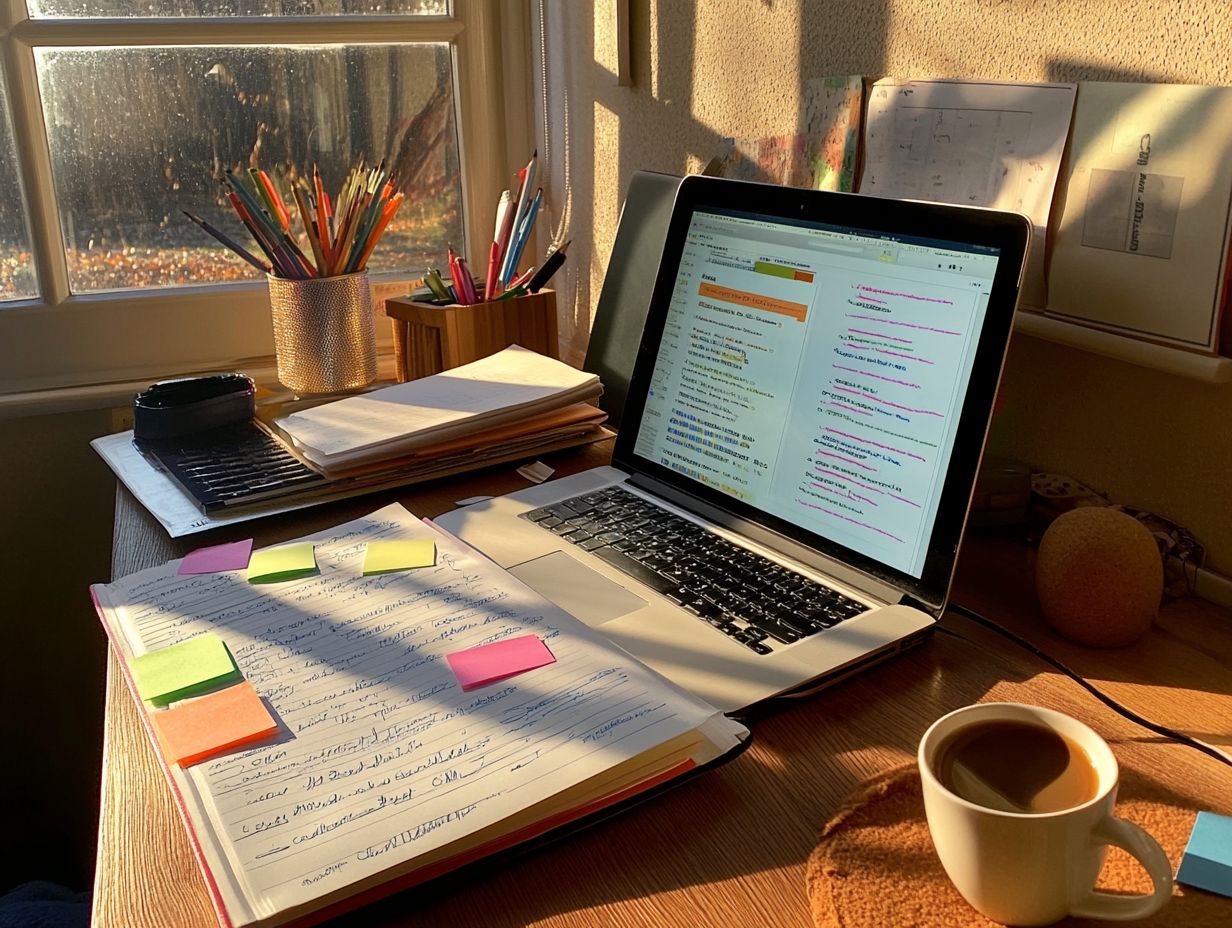
Seek assistance when necessary, whether through study groups or educational resources. This can significantly enhance your exam preparation and lead to a deeper understanding of the material.
Collaborating with fellow learners reinforces your knowledge and creates a supportive environment that reduces stress associated with upcoming tests.
Group study allows you to share diverse perspectives and clarify challenging concepts, making learning more engaging and effective.
Online platforms and forums like Reddit are invaluable resources. They provide a space to ask questions, share insights, and connect with peers facing similar academic hurdles.
This sense of community boosts your motivation and lightens the load of test anxiety, giving you the power to approach exams with renewed confidence.
15. Don’t Let Test Anxiety Get the Best of You
Manage test anxiety effectively to ensure it doesn’t undermine your performance. Use specific strategies for anxiety relief to cultivate a positive exam mindset.
Engage in deep breathing exercises right before the exam begins. Inhale slowly through your nose for a count of four, hold for another count of four, and exhale gently through your mouth for a count of six. Practice this breathing technique right before your exam for instant calmness.
Visualization techniques are very helpful. Before you enter the exam room, close your eyes and envision yourself confidently answering questions, savoring your sense of accomplishment.
This mental imagery alleviates anxiety and sharpens your focus, enhancing your preparedness and making a remarkable difference during high-pressure moments.
Unlock Your Success: Top Exam Strategies!
The most effective exam strategies blend various preparation techniques and insightful tips that enhance both your knowledge retention and performance on exam day, giving you the power to approach different question types with confidence.
Understand that exams can take many forms. Tailor your strategies to fit the specific format, whether it s multiple-choice, essays, or practical assessments.
Practice with past papers to get accustomed to the format and question styles. Utilize resources like online tutorials, study groups, and educational apps to deepen your understanding of the material.
Cultivating a positive mindset through regular self-reflection and mindfulness techniques is crucial. This approach reduces anxiety and improves focus, paving the way for more successful outcomes.
Remember, practice these techniques today and step into your exam with confidence!
Frequently Asked Questions
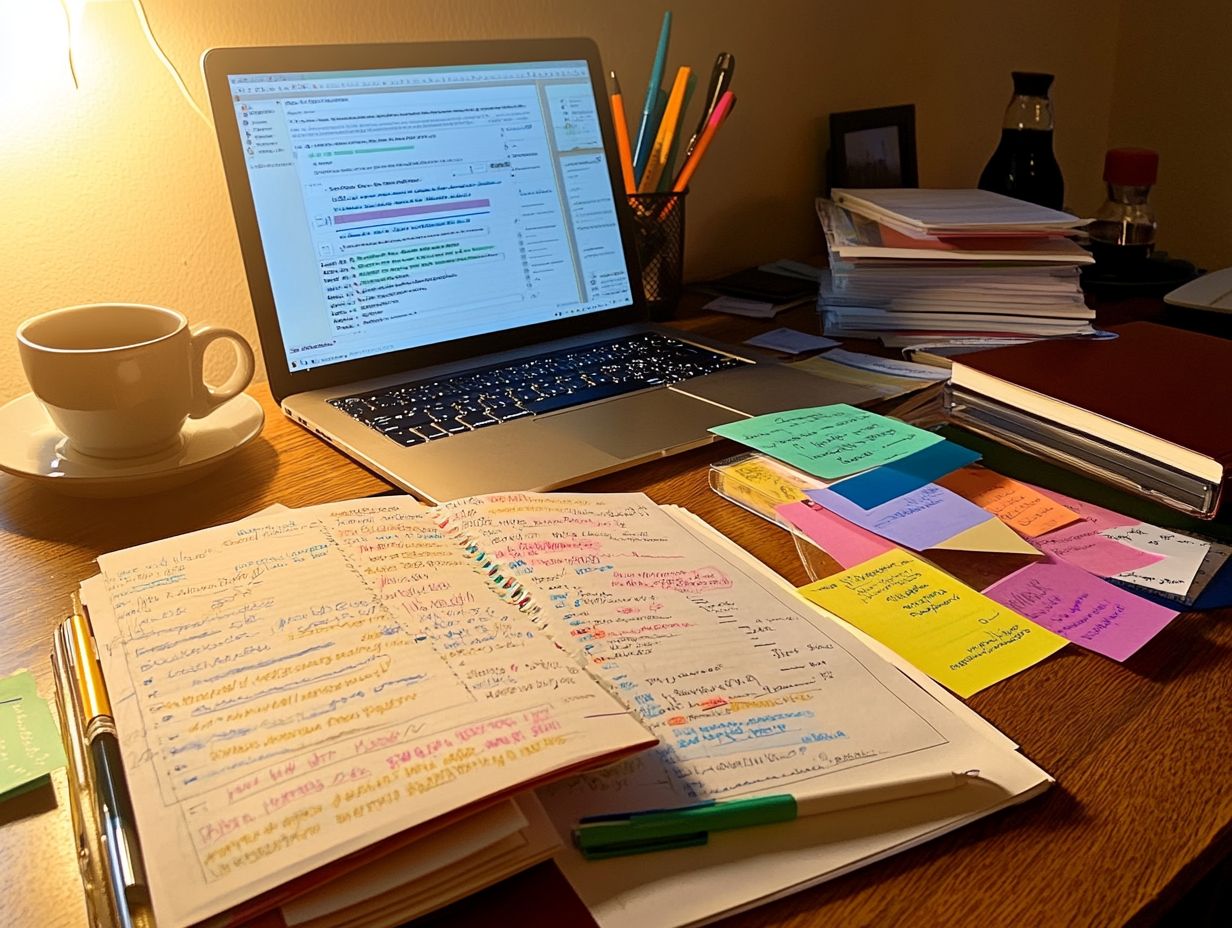
What are the best resources for test-taking strategies?
Some of the best resources for test-taking strategies include online articles, books, study guides, workshops, and tutoring services. For a comprehensive overview, check out what resources are available for test preparation. These resources provide valuable tips and techniques for improving test-taking skills and increasing test scores.
How do online articles help with test-taking strategies?
Online articles offer a convenient and accessible way to learn about test-taking strategies. Many websites and blogs provide comprehensive guides on how to approach different types of tests, manage test anxiety, and improve test performance.
How Can Test-Taking Strategies Vary Depending on the Type of Test?
Test-taking strategies can differ immensely based on the type of exam you’re facing, whether it’s multiple choice, essay, or short-answer questions. Each format calls for specialized techniques.
Navigating these various formats can indeed be a challenge. Each type requires a distinct approach for achieving optimal results.
For instance, with multiple-choice questions, you need to hone your attention to detail and practice eliminating obviously incorrect answers. In contrast, essay questions demand a well-organized structure and a clear argument to convey your understanding of the subject matter effectively.
Short-answer questions present their own unique challenge. You must deliver concise yet comprehensive responses while balancing brevity and depth.
By developing strategies tailored to these different formats, you can tackle each question type with confidence and competence. This significantly boosts your overall test performance.
What Are Some Common Mistakes to Avoid During a Test?
Avoiding common mistakes during a test is vital for maintaining focus and ensuring a clearer understanding of each question. This ultimately contributes to your success.
Many students encounter challenges, such as misreading questions, which can lead to incorrect answers. Poor time management may leave you racing against the clock, adding unnecessary stress to the experience.
To navigate these pitfalls, take the time to read each question more than once to fully grasp its requirements. Keeping an eye on the clock will help you allocate your time wisely, allowing for a balanced approach to all questions.
Developing a quick strategy to tackle the easier questions first can boost your confidence and ensure that you don t leave any items unanswered.
How Can One Prepare Mentally and Emotionally for a Test?
Preparing yourself mentally and emotionally for a test is just as crucial as your academic preparation. A strong exam mindset can significantly reduce stress and boost your thinking skills on the big day.
To achieve this, you can employ techniques that enhance your mental readiness. For instance, imagining yourself in the exam scenario creates a sense of familiarity and control that can be invaluable.
Using positive affirmations helps build your self-confidence. This shifts your focus from anxiety to positive thoughts.
It s also vital to adopt stress management strategies, such as mindfulness or deep breathing exercises, to cultivate a calm mental state.
By integrating these approaches into your routine, you can create an environment that fosters optimal performance during your exams.
What Are Some Additional Resources for Test-Taking Strategies?
Exploring additional resources for test-taking strategies can significantly enhance your exam preparation. Don’t miss out on the best online resources for test prep and these valuable insights!
Consider looking into study groups, online forums, and reputable publications for guidance. Joining study groups allows you to share effective strategies and hold one another accountable, making collaboration a powerful ally.
Online forums, such as those on Reddit or specialized educational platforms, provide spaces for discussions that can reveal unique approaches to challenging topics.
For example, Harvard Health is a treasure trove of articles on stress reduction techniques that can help you maintain a calm mindset during exams. Medical News Today provides updates on research in memory techniques designed to optimize your study sessions.
Start exploring these resources today to boost your test-taking skills!
Can books be effective resources for test-taking strategies?
Yes, books are fantastic resources for test-taking strategies. They provide detailed explanations and valuable examples, but understanding the best study environment for test-taking success can also greatly enhance your preparation.
Books also offer practice questions that help students apply what they learn.
Are study guides useful for test-taking strategies?
Study guides are excellent for test preparation. They include tips for tackling tough questions and offer practice materials.
How can attending workshops benefit test-taking strategies?
Workshops are a great way to engage with learning. You ll participate in group activities that help refine your skills.
You’ll also have the chance to ask questions and get feedback from experienced instructors.
Is tutoring a good option for improving test-taking strategies?
Yes, tutoring provides personalized support. A tutor tailors teaching methods to meet each student’s needs.
They offer one-on-one guidance to help overcome specific test-taking challenges.

